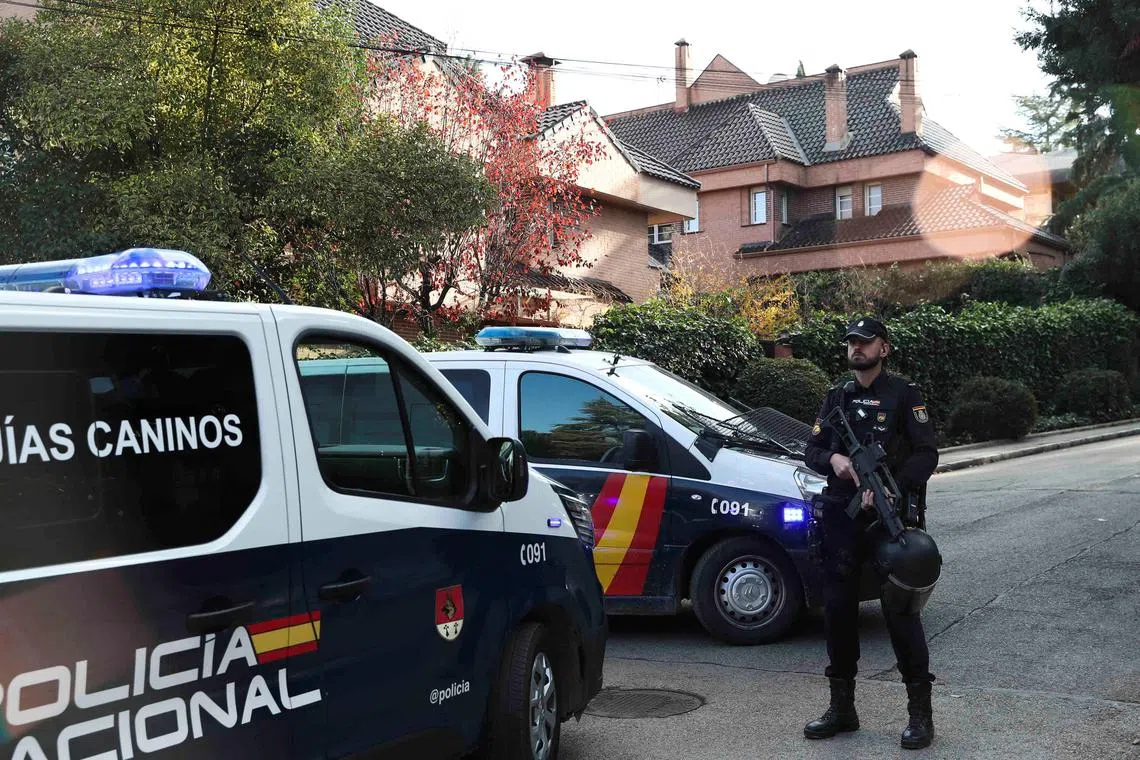Russian agents suspected of directing far-right group to mail bombs in Spain
Sign up now: Get ST's newsletters delivered to your inbox

Six letter bombs were sent in late November and early December to sites mostly in Madrid.
PHOTO: REUTERS
WASHINGTON – American and European officials believe that Russian military intelligence officers directed associates of a white supremacist militant group based in Russia to carry out a recent letter bomb campaign in Spain whose most prominent targets were the prime minister, the defence minister and foreign diplomats, according to US officials.
Spanish and foreign investigators have been looking into who sent six letter bombs in late November and early December
No one was killed in the attacks, which US officials consider terrorism. An employee of the Ukrainian Embassy was injured when one of the packages exploded.
Investigators in recent weeks have focused on the Russian Imperial Movement, a radical group that has members and associates across Europe and military-style training centres in St Petersburg, the officials said. They added that the group, which has been designated a global terrorist organisation by the US State Department, is believed to have ties to Russian intelligence agencies. Important members of the group have been in Spain, and police there have tracked its ties with far-right Spanish organisations.
United States officials say the Russian officers who directed the campaign appeared intent on keeping European governments off guard and may be testing out proxy groups in the event Moscow decides to escalate a conflict.
The apparent aim of the action was to signal that Russia and its proxies could carry out terrorist strikes across Europe, including in the capitals of member states of the North Atlantic Treaty Organisaion (Nato) which is helping defend Ukraine against Russia’s invasion, said the US officials, who spoke on the condition of anonymity because of the sensitivities around the investigation.
Spain is a member of the Nato alliance and has given military and humanitarian aid to Ukraine, as well as diplomatic support.
One of the letter bombs was sent to Instalaza, a weapons-maker in Zaragoza that manufactures grenade launchers that Spain is giving to Ukraine, and another went to the Torrejón de Ardoz Air Base outside Madrid.
There are no signs that Moscow is ready to engage in widespread covert attacks or sabotage in Europe, which Russian officials believe could provoke a response from Nato and, potentially, a costly wider conflict, according to US and allied officials. For that same reason, President Vladimir Putin of Russia and his generals have not ordered a conventional attack on a Nato country.
Mr Putin’s calculus on terrorist attacks could change if Russia continues to suffer major setbacks in Ukraine, US officials say. Mr Putin has given his military intelligence agency wide latitude to develop and conduct covert operations in Europe, but the degree to which the Kremlin was involved in the letter bomb operation is unclear, they say.
“This seems like a warning shot,” said Nathan Sales, the State Department’s counterterrorism coordinator in the Trump administration, when the Russian Imperial Movement was designated a terrorist organisation. “It’s Russia sending a signal that it’s prepared to use terrorist proxies to attack in the West’s rear areas.”
The Russian officers behind the bombing campaign work for the Main Directorate, commonly referred to as the GRU, one of Moscow’s more aggressive intelligence shops, US officials say. In recent years, the group has carried out bold and lethal covert actions with impunity.
Members of the agency have been involved in a range of shadowy activities, from interfering in the 2016 US presidential election to shooting down a Malaysian civilian airliner over Ukraine in 2014, according to US officials.
One specific part of the agency, Unit 29155, has tried to destabilise Europe through attempted coups and assassinations, according to US and European security officials. Its agents include Russian war veterans, and it was so secretive that most GRU operatives probably did not know it existed. US and allied officials learned about the unit only in recent years.
US officials suspect that the Russian officers involved in the Spain action are part of the 161st Special Purpose Specialist Training Center, whose headquarters in eastern Moscow house Unit 29155, among other groups, US officials say.
Spanish investigators have identified “persons of interest” they believe were involved in the attacks, one senior US official said.
US and British intelligence officials have been working with the Spanish national police and counterintelligence officials on the investigation. Their suspicions about the Russian Imperial Movement and the GRU coalesced late last year, soon after the bombs were discovered, US officials say.
The ability to use the Russian Imperial Movement as a sometime proxy force is useful to Russian intelligence, particularly because that makes it more difficult for rival countries to attribute actions to the Russian government.
The State Department designated the group and its leadership global terrorists in April 2020, the first time such a label had been applied to a white supremacist group. NYTIMES


